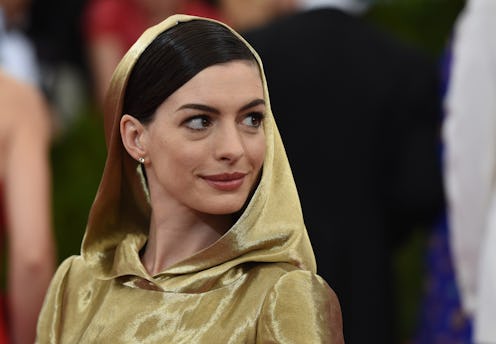Entertainment
Anne Hathaway Will Flourish On Television
I'm going to be real with you guys. I never did get the "Hathahate." Anne Hathaway may have fallen off my radar after seeing her in Brokeback Mountain followed by The Princess Diaries created a conflict of interest that my teenage mind could not wrap around, but I've never thought she was anything less than a great actress — even when everyone was putting her down. So to hear that Hathaway will be moving to TV in order to join the mini-series The Amabassador's Wife is great news for me, and, to be honest, for her. TV seems to be the new frontier of career advancement these days, and Hathaway has already proven her acting chops in movie after movie. The slightly different medium will be great for her to exercise some new muscles in that arena.
As Bustle's Maggie Malach put it, "Television is only continuing to grow and provide higher and higher quality content. It may never supersede the prestige of films, but it certainly gives another platform on which to tell incredible stories." And I think Hathaway is at a point in her career where she needs another platform to tell the incredible stories that she wants to tell with her characters. Her movies have become of higher and higher profile since her humble beginnings, and she has tried all kinds of new things that she never has before. Why not TV? But if you're still not convinced, here are my top six reasons why Hathaway moving to TV is a smart career move.
1. Diversity Is More Common On TV
I will only stop preaching about this when the media landscape starts improving. Diversity on TV is much, much, much more common than diversity in blockbuster movies. While we're still fighting for a Black Widow movie, and waiting for a recent superhero movie starring a person of color, we can find television shows with mostly black casts, mostly Asian casts, and with prominent LGBT characters. Online platforms like Netflix and Amazon provide us with even more diversity, while, at the theaters, movies remain in the past. This jump gives Hathaway a chance to dive into a more diverse world, and interact with actors and actresses she might not have gotten the opportunity to play off of in movies.
2. The Story Is More Fluid
Unlike a movie, where the entire story is written from start to finish with very little room for variation aside from what scenes get cut in edits, the storyline of a television show is a lot more fluid. Things can grow and change based on such factors as fan reactions or a character's unexpected growth. Sure, Hathaway will be starring in a mini-series, which is basically like a movie cut into parts, but who says that has to be her only television project ever? Joining another TV show where the plot doesn't remain so strict would offer her a lot of room to grow and improvise as an actress.
3. You Can Build A Bigger Fanbase
TV might not be as big as movies, but I like to think the fans are a lot more militant. 'Ship wars, debates, thinkpieces, and all kinds of multimedia fan works tend to follow in the wake of new episodes of TV shows, more so than you get with a one-shot film. Hathaway will have the opportunity to build herself an entirely new, and entirely dedicated, fan base, depending on how her run on the show goes.
4. You Have More Control Over Your Character
Sometimes characters grow. Sometimes characters change. Sometimes characters reveal something to you that you didn't see before. In a movie, that kind of thing has to be stamped down on because there is only so much room for improvisation in an airtight script, but a TV show offers a lot more freedom on that score. This goes hand in hand with the freedom inherent in the fluid storyline, and it's another reason The Ambassador's Wife shouldn't be Hathaway's first and final TV project.
5. You Can Juggle More Projects
Hey, shows don't always work out. Or, in this case, they do, but they end just as soon as they began. Unlike a movie, which can require some pretty intensive filming, you can fit a lot of TV projects back to back depending on how your role is. Just as Matt McGorry, who stars in both How To Get Away With Murder and Orange Is The New Black. It's got to be a lot less stressful than trying to film two movies at once.
6. You Get More Immediate Feedback
Once you shoot a film, that's it. Whether people love it or hate it, there's nothing you can do to change their minds after that. A TV show will air episodes before filming has wrapped on the season finale, giving actors and producers the chance to see how fans are reacting before the story is closed — and try to end on a high note without any of the problems that fans and critics are siting in the first few episodes.
Basically, experimenting with the TV medium is something that was a long time in coming for Hathaway, and I look forward to seeing how she does. If she handles TV as graceful as she handled movies, the last of the Hathahaters will be eating their words.
